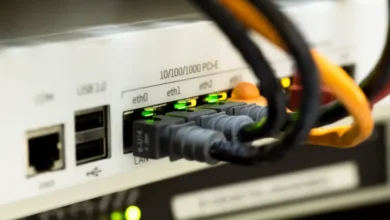7 Cybersecurity Tips to Protect Your Personal Information
Over 20 million personal records got exposed by hackers in March 2021. Your data is everywhere, and you need to protect it. You could become a victim of ID theft, a scam, or have your money taken from a bank account. It’s hard to do when you have so many different accounts. There are a few things that you can do to protect not just your personal data, but your family’s data as well. Read on to learn the top cybersecurity tips for online security.
Always Use Strong Passwords
The most common passwords are surprisingly weak. That invites hackers to steal your personal data. If you’re like most people, you probably use the same password and email address for the majority of accounts. The problem with that is when your data gets exposed on one site.
Hackers can easily get into all of your other accounts. You have to use strong and different passwords across your online accounts. How do you keep track of strong passwords? Use a password manager. Using the one in your browser is the most ideal situation, but what if you switch between browsers often? You might rely on Safari on one device, and Chrome on another. Rather than put your passwords at risk, migrate them to a third-party password manager. You can bring up your passwords on multiple devices while keeping them secure in one place. Most password managers cost between $20-$40 a year.
Update Software
You’re in the middle of an important project and you get a notification to update software. You intend to do it after you’re done, but you put it off. You keep putting it off. The longer you put it off, the more at risk you are. That’s because these updates contain important security patches. New software always has some kind of vulnerability.
These don’t get discovered until someone pokes around the code and discovers the security holes. Developers work to fix them as soon as possible. These security updates protect you from new online threats, too. Your online security is at risk because hackers are aware of these vulnerabilities. They can expose them before you update the software.
Check Before Sending Money or Personal Data
Homebuyers lost thousands in scams were duped by legitimate-looking emails. Hackers would spoof an email address of an escrow company and send an email to buyers. They’d ask them to deposit money in an account for closing costs, escrow, or something related to the purchase.
The unsuspecting buyers would send money assuming that it was legitimate. They’d be out a down payment or savings. Emails similar to this go out all of the time. People spoof pastors’ emails asking for church donations. The bottom line is that you can’t trust these requests. You have to verify them before you send money, bank account info, or other personal data.
Don’t Fall For Email Scams
There are other types of email scams to worry about. Some look like they’re from tech companies like Amazon and PayPal. They usually ask you to click on a link or enter password information. Check with the companies or look up the content of the email before you address the issue. It’s likely a scam. You’re not the only one to get the email, and you’re going to be able to find out about it through a simple search.
Hackers get more sophisticated, and you have to apply the same scrutiny to text messages as you do to emails. Never click on a text or email unless you know who it’s from.
Clean Out Old Data
Computers tend to last between 4-6 years. Think about all of the services you signed up for and didn’t use, the passwords stored, and all of the other personal data floating around your device. That old stuff could contain a lot of helpful personal data and bog down your computer at the same time. You should have a system to clean up old data and documents. There are programs that help with cleanup and performance.
What should you use? There are several programs that can claim the best Mac cleaner software 2021. Daisy Disk and Gemini are among them. Windows users can use Microsoft Total PC Cleaner or Restore.
Secure IoT Devices
You don’t just have to worry about your computer to keep your personal data safe. You also have to worry about your phones, tablets, security system, and even kitchen appliances. Everything that connects to a network is at risk of a cyberattack. It’s unlikely that someone will hack your coffee maker, but it could happen because it’s on a network.
Keep your entire network secure by using a password-protected network. Use strong passwords on your network and devices. If you do need to upgrade a device, be sure to completely wipe off the data of the old device before getting rid of it.
Educate Everyone
Anyone in your household could become the victim of a cyberattack. As elderly and young people increase their use of internet devices, you’ll find that they’re not as savvy as you are. You need to step up and educate everyone in your household about online safety. If they click on the wrong link, they could end up bringing down your entire home network. Have a cybersecurity checklist that they can go through before clicking on a link or sending information. If they’re not sure, make sure you’re available to help them understand.
Cybersecurity Tips to Make Online Safety a Priority
Online security is more important than ever. These cybersecurity tips showed you several ways to protect your personal data and your devices. Always assume that someone is out to steal your personal data. Use strong passwords and keep them safe. Do simple things like clean your computer regularly. These all contribute to a safe environment online. For more tech tips, check out the other articles on the blog!




